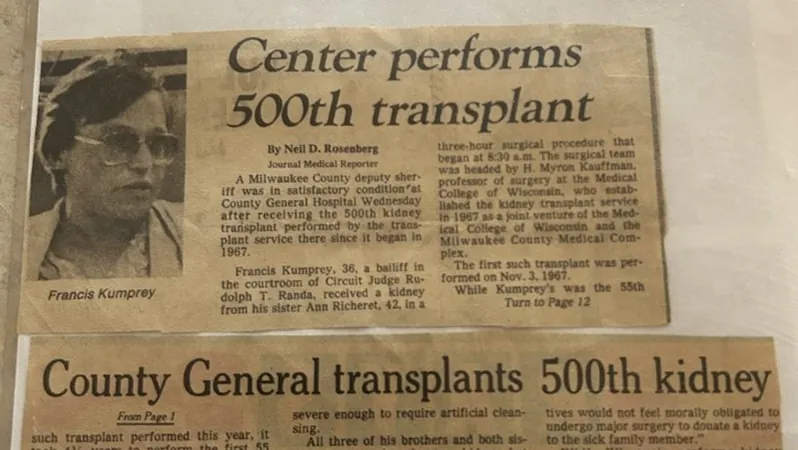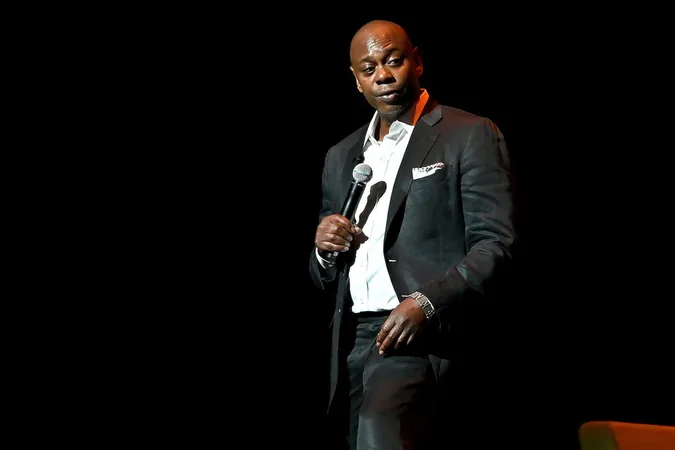
A Remarkable Legacy: Frank Kumprey’s 44 Years of Life After Kidney Transplant
2025-01-27
Author: Ying
Introduction
In a heartwarming story of resilience, former Milwaukee County Sheriff's Deputy Frank Kumprey made headlines in 1980 when he received the 500th kidney transplant at Milwaukee County General Hospital. At 36, Frank was battling severe kidney issues for a decade and had undergone extensive dialysis treatments. Thanks to the selfless donation from his older sister Anna, he was given a second chance at life—a gift he would cherish for over 44 remarkable years.
Life After Transplant
Frank passed away recently at the age of 81 at a hospice in Wauwatosa, following a series of health challenges. His long survival post-transplant is astonishing, especially considering that the average life expectancy for a kidney transplant patient in the 1980s was only 10 to 15 years.
His wife Barb Kumprey expressed hope that Frank's incredible journey would inspire others undergoing similar procedures, stating, “He was appreciative of having this gift and made the most of it. He had just wonderful friends and family; it really was a good life for him.” Frank's life indeed reflected resilience and vibrancy, buoyed by his love for law enforcement, golf, and his family.
Medical Insights
Dr. Beje Thomas, medical director of Adult Kidney and Pancreas Transplant Programs at Froedtert Hospital, emphasized just how exceptional Frank's experience was. “Forty-plus years is remarkable; it's rare, especially for someone transplanted in the 1980s,” he noted. Advances in medical technology and improvements in immunosuppressant medications have significantly boosted transplant success rates in recent decades, with today’s 10-year survival rates nearing 80%.
Factors Contributing to Longevity
Several factors significantly contributed to Frank's longevity after his transplant. His determination to maintain an active lifestyle and his diligence in taking the required medications played crucial roles. Even while on dialysis for six months, Frank worked full-time as a courtroom bailiff, showcasing his admirable work ethic and commitment.
Early Life and Career
Born in 1943 in Greenfield, Frank was not one to let obstacles hinder his ambitions. Despite being born with kidney abnormalities, he excelled in school, participating in various sports, including football and wrestling. After earning a degree at what is now the University of Wisconsin-Eau Claire, he dedicated nearly 30 years to law enforcement.
Personal Life and Character
Frank and Barb were married for over 40 years, forging a deep partnership built on mutual respect. Known for his warm-hearted nature, Frank left lasting impressions on everyone he met, including family, friends, and colleagues. His commitment to community service and his passion for golf were defining aspects of his post-retirement life.
Challenges Faced
Despite facing a host of health challenges in later years, including knee and hip replacements and battling bladder cancer, Frank remained active until his body could no longer keep pace with him. His strength of spirit and positivity endeared him to many throughout his life.
Legacy and Impact
Numerous friends and former colleagues, including past and present Milwaukee County Sheriffs, came together to honor Frank during an emotional funeral service, further underscoring the depth of his impact on those around him.
Frank’s incredible story reminds us of the power of support systems, as Dr. Thomas pointed out the importance of strong social connections in achieving better health outcomes. In his memory, friends and family invite donations to the National Kidney Foundation, encouraging others to support the cause that likely helped countless patients like Frank.
Conclusion
Frank Kumprey's journey is not just a tale of medical achievement—it is a story of love, tenacity, and the indomitable human spirit, uplifting those who knew him and inspiring future generations battling similar medical struggles. His life serves as a beacon of hope for kidney transplant recipients everywhere, proving that a second chance at life can lead to extraordinary achievements.


 Brasil (PT)
Brasil (PT)
 Canada (EN)
Canada (EN)
 Chile (ES)
Chile (ES)
 Česko (CS)
Česko (CS)
 대한민국 (KO)
대한민국 (KO)
 España (ES)
España (ES)
 France (FR)
France (FR)
 Hong Kong (EN)
Hong Kong (EN)
 Italia (IT)
Italia (IT)
 日本 (JA)
日本 (JA)
 Magyarország (HU)
Magyarország (HU)
 Norge (NO)
Norge (NO)
 Polska (PL)
Polska (PL)
 Schweiz (DE)
Schweiz (DE)
 Singapore (EN)
Singapore (EN)
 Sverige (SV)
Sverige (SV)
 Suomi (FI)
Suomi (FI)
 Türkiye (TR)
Türkiye (TR)